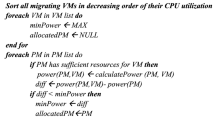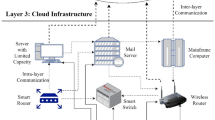Abstract
With the increasing advancements in the Internet of Things (IoT) and the growing production of tasks by IoT devices, the demand for cloud computing centers has become more critical than ever. The energy consumption in cloud computing servers has a significant impact on the overall costs and environmental pollution. This article addresses the task allocation problem to cloud computing servers with the aim of reducing energy consumption in those servers while maintaining Quality of Service (QoS). Evolutionary algorithms have been employed to solve this NP-hard problem. In this paper, a novel version of Equilibrium Optimization algorithm is defined and used for finding good solutions for this problem. In the proposed algorithm, a tournament operator is introduced to control selection pressure and enhance the algorithm’s exploration capability during local optima convergence, added to the EO algorithm. The utilization of this operator in the proposed algorithm eliminates the need for sorting all search agents at each iteration, resulting in reduced execution time. The simulation results indicate that the proposed algorithm has demonstrated a 24% improvement in performance compared to existing algorithms in solving the task allocation problem to servers in cloud computing environments.




Similar content being viewed by others
Data availability
No datasets were generated or analysed during the current study.
References
Singh, D.: Internet of Things Factories of the Future: Technological Advancements in the Manufacturing Industry, : pp. 195–227. (2023)
Cao, B., et al.: Security-aware industrial wireless sensor network deployment optimization. IEEE Trans. Industr. Inf. 16(8), 5309–5316 (2019)
Sun, G., et al.: Live migration for multiple correlated virtual machines in cloud-based data centers. IEEE Trans. Serv. Comput. 11(2), 279–291 (2015)
Xie, Y., et al.: A two-stage Estimation of Distribution Algorithm with Heuristics for energy-aware Cloud Workflow Scheduling. IEEE Transactions on Services Computing (2023)
Sadeeq, M.M., et al.: IoT and Cloud computing issues, challenges and opportunities: A review. Qubahan Acad. J. 1(2), 1–7 (2021)
Katal, A., Dahiya, S., Choudhury, T.: Energy efficiency in cloud computing data centers: A survey on software technologies. Cluster Comput. 26(3), 1845–1875 (2023)
Mou, J., et al.: A Machine Learning Approach for energy-efficient Intelligent Transportation Scheduling Problem in a real-world Dynamic Circumstances. IEEE transactions on intelligent transportation systems (2022)
Park, J., Han, K., Lee, B.: Green cloud? An empirical analysis of cloud computing and energy efficiency. Manage. Sci. 69(3), 1639–1664 (2023)
Madireddy, A.R., Ravindranath, K.: Dynamic virtual machine relocation system for energy-efficient resource management in the cloud. Concurrency Computation: Pract. Experience. 35(3), e7520 (2023)
Khaleel, M.I.: Region-aware dynamic job scheduling and resource efficiency for load balancing based on adaptive chaotic sparrow search optimization and coalitional game in cloud computing environments. J. Netw. Comput. Appl. 221, 103788 (2024)
Ali, A., Iqbal, M.M.: A cost and energy efficient task scheduling technique to offload microservices based applications in mobile cloud computing. IEEE Access. 10, 46633–46651 (2022)
Alghamdi, M.I.: Optimization of load balancing and Task Scheduling in Cloud Computing environments using Artificial neural networks-based Binary particle Swarm optimization (BPSO). Sustainability. 14(19), 11982 (2022)
Hu, B., et al.: Workload-Aware Scheduling of Real-Time Jobs in Cloud Computing to Minimize Energy Consumption. IEEE Internet of Things Journal (2023)
Sirisati, R.S., et al.: An Energy-Efficient PSO-Based Cloud Scheduling Strategy. in Innovations in Computer Science and Engineering: Proceedings of 8th ICICSE. Springer. (2021)
Desale, S., et al.: Heuristic and meta-heuristic algorithms and their relevance to the real world: A survey. Int. J. Comput. Eng. Res. Trends. 351(5), 2349–7084 (2015)
Sloss, A.N., Gustafson, S.: Evolutionary algorithms review. Genetic Program. Theory Pract. XVII. 2020, p307–344 (2019)
Hussain, K., et al.: On the exploration and exploitation in popular swarm-based metaheuristic algorithms. Neural Comput. Appl. 31, 7665–7683 (2019)
Jiang, H., et al.: An energy-efficient framework for internet of things underlaying heterogeneous small cell networks. IEEE Trans. Mob. Comput. 21(1), 31–43 (2020)
Wong, W., Ming, C.I.: A review on metaheuristic algorithms: recent trends, benchmarking and applications. in 7th International Conference on Smart Computing & Communications (ICSCC). 2019. IEEE. (2019)
Faramarzi, A., et al.: Equilibrium optimizer: A novel optimization algorithm. Knowl. Based Syst. 191, 105190 (2020)
Rai, R., Dhal, K.G.: Recent developments in Equilibrium Optimizer Algorithm: Its variants and applications. Arch. Comput. Methods Eng., : p. 1–54. (2023)
Varzaneh, Z.A., et al.: A new hybrid feature selection based on Improved Equilibrium optimization. Chemometr. Intell. Lab. Syst. 228, 104618 (2022)
Cheng, B., et al.: Situation-aware dynamic service coordination in an IoT environment. IEEE/ACM Trans. Networking. 25(4), 2082–2095 (2017)
Menaka, M., Kumar, K.S.: Workflow Scheduling in Cloud environment–Challenges, Tools, Limitations & Methodologies: A Review, p. 100436. Sensors, Measurement (2022)
Li, K.: Improving multicore server performance and reducing energy consumption by workload dependent dynamic power management. IEEE Trans. Cloud Comput. 4(2), 122–137 (2015)
Hu, B., Yang, X., Zhao, M.: Online energy-efficient scheduling of DAG tasks on heterogeneous embedded platforms. J. Syst. Architect. 140, 102894 (2023)
Daraghmeh, M., et al.: A power management approach to reduce energy consumption for edge computing servers. in. Fourth International Conference on Fog and Mobile Edge Computing (FMEC). 2019. IEEE. (2019)
Patil, K.: Hybrid genetic algorithm and modified-particle swarm optimization algorithm (GA-MPSO) for Predicting Scheduling virtual machines in Educational Cloud platforms. Int. J. Emerg. Technol. Learn., 17(7). (2022)
Mohiuddin, I., Almogren, A.: Workload aware VM consolidation method in edge/cloud computing for IoT applications. J. Parallel Distrib. Comput. 123, 204–214 (2019)
Al-Wesabi, F.N., et al.: Energy aware resource optimization using unified metaheuristic optimization algorithm allocation for cloud computing environment. Sustainable Computing: Inf. Syst. 35, 100686 (2022)
Prabha, B., Ramesh, K., Renjith, P.: A review on dynamic virtual machine consolidation approaches for energy-efficient cloud data centers Data Intelligence and Cognitive Informatics: Proceedings of ICDICI 2020, : pp. 761–780. (2021)
Pirozmand, P., et al.: An improved particle swarm optimization algorithm for task scheduling in cloud computing. J. Ambient Intell. Humaniz. Comput. 14(4), 4313–4327 (2023)
Zhang, J., et al.: Multi-USV Task Planning Method Based on Improved Deep Reinforcement Learning. IEEE Internet of Things Journal (2024)
Behera, I., Sobhanayak, S.: Task scheduling optimization in heterogeneous cloud computing environments: A hybrid GA-GWO approach. J. Parallel Distrib. Comput. 183, 104766 (2024)
Elmanakhly, D.A., Saleh, M.M., Rashed, E.A.: An improved equilibrium optimizer algorithm for features selection: Methods and analysis. IEEE Access. 9, 120309–120327 (2021)
Cao, B., et al.: Multiobjective 3-D topology optimization of next-generation wireless data center network. IEEE Trans. Industr. Inf. 16(5), 3597–3605 (2019)
Ali, H.S., et al.: Real-time task scheduling in fog-cloud computing framework for iot applications: a fuzzy logic based approach. in 2021 International Conference on COMmunication Systems & NETworkS (COMSNETS). IEEE. (2021)
Shang, M., Luo, J.: The tapio decoupling principle and key strategies for changing factors of Chinese urban carbon footprint based on cloud computing. Int. J. Environ. Res. Public Health. 18(4), 2101 (2021)
Park, M.: Non-preemptive fixed priority scheduling of hard real-time periodic tasks. in Computational Science–ICCS : 7th International Conference, Beijing, China, May 27–30, 2007, Proceedings, Part IV 7. 2007. Springer. (2007)
Zhao, L., et al.: Energy-efficient trajectory design for secure SWIPT systems assisted by UAV-IRS. Veh. Commun. 45, 100725 (2024)
Cao, B., et al.: Edge–cloud resource scheduling in space–air–ground-integrated networks for internet of vehicles. IEEE Internet Things J. 9(8), 5765–5772 (2021)
Wu, P., et al.: Optimizing locations and qualities of multiple facilities with competition via intelligent search. IEEE Trans. Intell. Transp. Syst. 23(6), 5092–5105 (2021)
Lyu, T., et al.: Source selection and resource allocation in wireless powered relay networks: An adaptive dynamic programming based approach. IEEE Internet Things J., (2023)
Houssein, E.H., et al.: Development and application of equilibrium optimizer for optimal power flow calculation of power system. Appl. Intell. 53(6), 7232–7253 (2023)
Xia, D., et al.: An adaptive stochastic ranking-based tournament selection method for differential evolution. J. Supercomputing, : p. 1–30. (2023)
Mood, S.E., JAVIDI, M.: A modified gravitational search algorithm and its application in lifetime maximization of wireless sensor networks. Turkish J. Electr. Eng. Comput. Sci. 27(6), 4055–4069 (2019)
Adler, N., Friedman, L., Sinuany-Stern, Z.: Review of ranking methods in the data envelopment analysis context. Eur. J. Oper. Res. 140(2), 249–265 (2002)
Shi, L., Zhang, Z., Robertazzi, T.: Energy-aware scheduling of embarrassingly parallel jobs and resource allocation in cloud. IEEE Trans. Parallel Distrib. Syst. 28(6), 1607–1620 (2016)
Hu, B., Cao, Z., Zhou, M.: Scheduling real-time parallel applications in cloud to minimize energy consumption. IEEE Trans. Cloud Comput. 10(1), 662–674 (2019)
Ebrahimi Mood, S., Javidi, M.M.: Rank-based gravitational search algorithm: A novel nature-inspired optimization algorithm for wireless sensor networks clustering. Cogn. Comput. 11, 719–734 (2019)
Yuan, X., Wang, L., Yuan, Y.: Application of enhanced PSO approach to optimal scheduling of hydro system. Energy. Conv. Manag. 49(11), 2966–2972 (2008)
Wang, R., Zhang, R.: Techno-economic analysis and optimization of hybrid energy systems based on hydrogen storage for sustainable energy utilization by a biological-inspired optimization algorithm. J. Energy Storage. 66, 107469 (2023)
Hou, M., Zhao, Y., Ge, X.: Optimal scheduling of the plug-in electric vehicles aggregator energy and regulation services based on grid to vehicle. Int. Trans. Electr. Energy Syst. 27(6), e2364 (2017)
Luo, J., et al.: Using deep belief network to construct the agricultural information system based on internet of things. J. Supercomputing. 78(1), 379–405 (2022)
Rodríguez-Fdez, I., et al.: STAC: a web platform for the comparison of algorithms using statistical tests. in. IEEE international conference on fuzzy systems (FUZZ-IEEE). 2015. IEEE. (2015)
Author information
Authors and Affiliations
Contributions
Alireza Souri: Conceptualization, Methodology, Writing - Original DraftSepehr Ebrahimi Mood: Validation, VisualizationMingliang Gao: Writing - Review & Editing, SupervisionKuan-Ching Li: Investigation, Manuscript Revision.
Corresponding author
Ethics declarations
Competing interests
The authors declare no competing interests.
Additional information
Publisher’s Note
Springer Nature remains neutral with regard to jurisdictional claims in published maps and institutional affiliations.
Rights and permissions
Springer Nature or its licensor (e.g. a society or other partner) holds exclusive rights to this article under a publishing agreement with the author(s) or other rightsholder(s); author self-archiving of the accepted manuscript version of this article is solely governed by the terms of such publishing agreement and applicable law.
About this article
Cite this article
Souri, A., Mood, S.E., Gao, M. et al. Tournament based equilibrium optimization for minimizing energy consumption on dynamic task scheduling in cloud-edge computing. Cluster Comput (2024). https://doi.org/10.1007/s10586-024-04489-1
Received:
Revised:
Accepted:
Published:
DOI: https://doi.org/10.1007/s10586-024-04489-1




